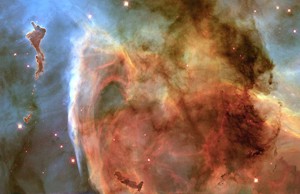
After our rather spirited discussions of Intelligent Design over the last couple of months I think it would be useful to consider the concept of methodological naturalism, both its purpose and its limits.
Although there are technical philosophical definitions that vary somewhat – on a practical level methodological naturalism is the underlying principle in modern science that there is a continuity of
cause and effect accessible to testing and rational synthesis. The
universe is comprehensible and obeys set laws. Scientific research seeks to understand these laws and processes, to discern how they have operated to produce what we see around us, and to utilize them,as good stewards for the good of all (OK … ideally as good stewards for the good of all).
It is sometimes claimed that science is religiously neutral. This is generally true in principle – but often not in practice, public rhetoric, or application. There is a rather old (1997) two-part article by Alvin Plantinga that I would like to use to focus a conversation today. You can find it here: Methodological naturalism? Part 1 and Part 2. From my reading I suggest that this article misses the mark in some rather serious ways – but also has some excellent insights and opens some significant topics for discussion, especially in Part 1.
In Part 1 Plantinga presents three examples to use in the exploration of religious neutrality in science. (1) Altruism, (2) Evolution (especially common descent) and (3) Cosmic fine tuning. As we look at his examples and consider the following questions:
Is scientific investigation of these questions religiously neutral? and What role does methodological naturalism play in the investigation of each of these questions?
Today I will simply put out Plantinga’s examples with a little commentary and open the floor for comments and conversation.
Altruism is an interesting phenomenon. Why should any rational being sacrifice self for someone or something else – especially someone or something else not kin? In his article Plantinga sites an economist Herbert Simon who asks why people like Mother Teresa devote time, energy
and entire lives to the welfare of other people. On the surface this is intrinsically irrational behavior – it serves neither personal self interest nor the evolutionary interest of propagation of the “selfish gene.” Altruism should be a feature counter to natural selection and survival of the fittest. Issues of morality and human rights fall into the same category. Plantinga suggests that methodological naturalism applied to topics such as altruism and morality simply misses the boat. It is straightforwardly incompatible with Christian teaching. A Christian approach will yield true insight unavailable in the constrained view of ontological, or even methodological, naturalism.
The Grand Evolutionary Myth. Plantinga makes a much quoted observation as he discusses methodological naturalism with respect to human evolution and common descent.
From a theistic or Christian perspective, however, things are much less frantic. The theist knows that God created the heavens and the earth and all that they contain; she knows, therefore, that in one way or another God has created all the vast diversity of contemporary plant and animal life. But of course she isn’t thereby committed to any particular way in which God did this. He could have done it by broadly evolutionary means; but on the other hand he could have done it in some totally different way. …
A Christian therefore has a certain freedom denied her naturalist counterpart: she can follow the evidence where it leads. If it seems to suggest that God did something special in creating human beings (in such a way that they are not genealogically related to the rest of creation) or reptiles or whatever, then there is nothing to prevent her from believing that God did just that.
Plantinga goes on to suggest that a Christian approaching the grand evolutionary story is free to reject the narrative based on an alternative unavailable to the non theist. Methodological naturalism need not give truth.
The epistemic probability of the whole grand evolutionary story is quite different for the theist and for the naturalist. The probability of this story with respect to the evidence together with the views a theist typically holds, is much lower than its probability with respect to evidence together with the views the naturalist typically holds. So the way in which the theory of evolution is not religiously neutral is not, … that it is straightforwardly incompatible with Christian teaching; it is rather that the view in question is much more probable with respect to naturalism and the evidence than it is with respect to theism and that evidence.
While I agree with Plantinga on the available options – I disagree on a more significant level with his conclusion regarding evolution. It is not a commitment to methodological naturalism that leads most Christians in the sciences, including the vast majority of biologists and biochemists, to accept the evolutionary framework including common descent. It is the strength of the available evidence, especially the genetic evidence, as Francis Collins (The Language of God), Darrel Falk (Coming to Peace With Science) and others have tried to make clear. Many Christians have been forced to that realization, despite their intentions and inclinations.
Plantinga also discusses the element of randomness and chance that is invoked in the discussion of evolution – and suggests that this is an area where methodological naturalism fails. “No doubt God could have created us via evolutionary processes; if he did it that way, however, then
he must have guided, orchestrated, directed the processes by which
he brought about his designs.” While this is a common view, randomness does not necessarily mean highly contingent or accidental. Simon Conway Morris (Life’s Solution) provides a good discussion of convergence in evolutionary mechanism and suggests that the evolution of sentient beings capable of creative thought, moral behavior, altruism, and worship was inevitable – and part of the design via, not despite, the natural, even “random,” processes of chemistry and physics active in evolutionary biology.

Cosmic Fine Tuning. We have discussed these ideas on the blog in the past (see The Heavens Declare and A Fine Tuned Universe 4 among others) – but the gist is simple. The universe in which we live is exquisitely prepared for the existence of life. There are a number of constants that govern the properties of the universe that appear to be finely tuned to make life possible. Plantinga suggests that methodological naturalism requires the search for a rational explanation for this apparent design – and an explanation that preserves the indifference of nature to cosmic coincidences and human life. This leads to speculation and theories such as Alan Guth’s multiverse and even Dawkins’s rather incredible suggestion that the universes evolved to a form suitable for life (See the God Delusion). A theist finds nothing surprising about a universe designed for life – and can take the evidence as it appears. Perhaps Guth’s theories will be found to be correct. I am fairly certain that Dawkins’s speculation isn’t correct.
Methodological naturalism shows its face in different manners in each of these examples, and the direction the discussion takes varies.
Methodological naturalism is intrinsically insufficient in the consideration of issues of morality and altruism. Science is ill-suited to provide anything more than rationalizations and supporting information – sometimes important, but nonetheless accessory – for these realities.
On the other hand methodological naturalism is both sufficient and entirely appropriate in the study of evolutionary biology. The evidence and processes involved fall cleanly within the realm of chemistry and physics.
In cosmology the question is somewhat different – and isn’t really a question of methodological naturalism, but rather one of ontological naturalism. A commitment to ontological naturalism requires the elimination of cosmic coincidence. Methodological naturalism simply takes what is set forth and looks for the rational synthesis and explanation in terms of predictable laws and processes.
What do you think? What role does methodological naturalism play in the investigation
of each of these questions? Is it valid?
If you wish to contact me, you may do so as rjs4mail[at]att.net.

